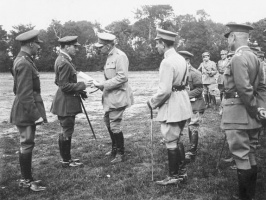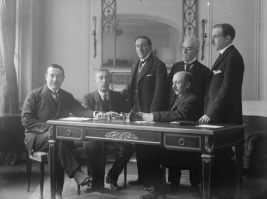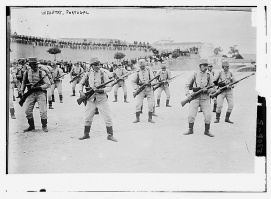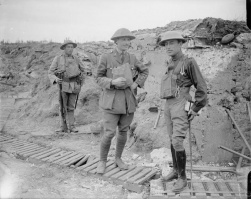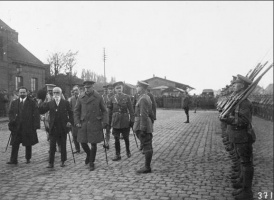Introduction↑
In the pre-1914 international system, Portugal’s diplomatic position was largely determined by its status as one of Britain’s client states in Western Europe. Bound together by an alliance that went back to the 14th century, the two countries had fought on the same side in a number of major European conflicts, including the Napoleonic wars when Wellington’s armies used Portugal as their base to drive the French out of the Iberian Peninsula. Britain's economic prowess allowed the country to play a key role in the development of other European nations throughout the 19th century and Portuguese rulers and economic agents were keen to turn to their senior ally to secure the indispensable financial and technological means that might put Portugal on a modernizing track.
In the same period, however, Anglo-Portuguese relations were also marred by episodes of tension and conflict, from commercial disputes to rivalries in the colonial sphere. In 1890, Portugal’s dream of setting up a vast sphere of influence in Central-Southern Africa (the so-called “rose-colored map” which aimed at connecting Angola and Mozambique through a land corridor encompassing present day Zimbabwe as well as parts of Zambia and Malawi) was suddenly brought to an end by a British ultimatum which enfeebled the ruling Bragança dynasty and left a deep resentment among the more nationalist-minded members of the Portuguese elite. The newly formed Republican Party in particular took advantage of the opportunity to further its patriotic credentials both as the champion of the imperial project and the uncompromising enemy of British “arrogance.”[1]
But traumatic as the ultimatum crisis may have been for Portugal’s elites, it soon became evident that some kind of rapprochement would have to take place in order to salvage a relationship that was still seen by many as mutually advantageous. In the eyes of British rulers, Portugal continued to play an important role in their global strategy not only due to the position of some of its islands and ports in several British maritime routes, but also on account of the sensitive location of a colony like Mozambique, whose ports were to assume a critical role in the coming confrontation with the Boer republics. For the Portuguese, even though it was difficult to cope with the asymmetric nature of the alliance, their national weaknesses forced them to swallow their pride and work for the preservation of a relationship that was impossible to replace in the strategic circumstances of the late 19th century.[2]
The Republic and the Anglo-Portuguese Alliance↑
Portugal’s cooperative attitude during the Boer War and the good mood that prevailed between Lisbon and London in the opening years of the 20th century were not sufficient to encourage the British to assist the embattled Bragança dynasty when its critical hour arrived. After Carlos I, King of Portugal’s (1863-1908) assassination in 1908, the hesitating course which the monarchical governments undertook in the following months convinced Herbert Henry Asquith’s (1852-1928) government that it would be counterproductive to bolster an increasingly unpopular regime.[3] Besides, in the volatile international atmosphere of the time, a new and insecure administration in Lisbon might even present some advantages to Britain. For example, the Portuguese colonies might be used as a bargaining chip to appease some of its European rivals. Two years after the advent of the Republic in Portugal, British diplomats were already engaged in conversations with Berlin which, building on a previous agreement first reached in 1898, envisioned the partition of the Portuguese empire. A “disposable” Portugal might also be useful to London to secure the friendship of the Spanish, whose 1908 program of naval rearmament was perceived by the Admiralty as the factor that might tip the scales in favor of the Entente in the Mediterranean (at least as long as Italy remained a member of the Triple Alliance). In December 1912, this position was explicitly advocated by the Admiralty in a debate in Whitehall on the future of the Anglo-Portuguese alliance. According to the First Lord of the Admiralty, Winston Churchill (1876-1965), London’s paramount interest vis-à-vis Portugal rested in the latter’s disposition to deny any other “strong maritime state” the same type of facilities that Britain enjoyed in the latter’s coastline and Atlantic islands; but, according to Churchill, to secure this objective a formal alliance was superfluous – simple diplomatic pressure would do.[4]
Fortunately for the Portuguese, another school of thought managed to make its voice heard in this debate. Its exponent was the influential Foreign Office official, Eyre Crowe (1864-1925), according to whom it would be a mistake to take for granted Lisbon’s compliance with British interests. The logical way to preserve Portugal’s useful neutrality, Crowe argued, was through the cultivation of the age-old flexible bilateral alliance.
Although Portuguese politicians and diplomats were ignorant of the precise content of this latter discussion, they eventually learned some of the details of the agreement concerning the division of their colonies and were always suspicious of Britain’s stance towards Alfonso XIII, King of Spain’s (1886-1941) “hegemonic” designs in the Iberian Peninsula. The fact that London took almost a year to grant de jure recognition to the Portuguese regime that had emerged from the October revolution of 1910 only added to its leaders’ sense of insecurity, which frequently verged on paranoia.[5] From then on, the improvement of the First Republic’s standing in Europe and the replacement of Britain’s tutelage for a more balanced Anglo-Portuguese partnership became the top priorities of the foreign policy agenda.
To the dominant force of the First Republic’s party system, the Democratic Party, the opening of the hostilities in Europe in August 1914, and in particular a French request of artillery pieces for the defence of Paris during the Marne offensive (thirty-six Schneider 75-millimeter pieces), offered a window of opportunity that could not be missed. By joining the Entente coalition, Portugal would be well positioned to attain three fundamental goals. The first amounted to earning the respect and admiration from Europe’s great powers (some of which remained highly sceptical of the Republic’s governing record), with a special reference to Britain. As one of the exponents of this current, the Portuguese minister in Paris, João Chagas (1863-1925), stated in his personal diary in the summer of 1914, “this moment presents the country with a unique opportunity to acquire some personality. If the opportunity is squandered, the nation will be lost.”[6] The second was the “strategic differentiation” that a belligerent status would confer to Portugal in the Iberian Peninsula, therefore strengthening its links with the Western powers and thwarting Madrid’s allegedly annexationist aspirations. The third goal was the obtainment of a place at the future peace conference, where Portugal would find itself in a suitable position to safeguard its interests and kill off any initiative which a “duplicitous” ally like Britain might feel tempted to sponsor to deprive it of some of its colonial assets.
Given the sort of threats that had acquired some salience in the preceding years (the deterioration of ties with Britain, “Spanish danger” and speculations concerning the break-up of the empire), this line of reasoning seemed credible enough. However, sceptic voices were soon raised. The gist of their argument had to do with the fact that the Allies were not at all interested in Portugal’s active belligerency in Europe as demanded by the interventionists. If the country wished to make some gains from services rendered to the Entente’s cause, then it would not make much sense to force upon the Allies a belligerency which their military commanders saw as useless given Portugal’s lack of preparedness for the war. These critics, among whom figured senior cabinet members, such as the Minister for Foreign Affairs, Augusto Freire de Andrade (1859-1929), and the leader of the main centre-right party, Manuel de Brito Camacho (1862-1934), were closely aligned with the stance adopted by the British authorities in August 1914 who had asked the Portuguese government to abstain from proclaiming its neutrality in the conflict. Britain’s expectation was to benefit from a number of services performed by Portugal, or even from Portugal’s military participation in the African theatre, none of which rendered automatic a declaration of war on Germany.[7]
This ambiguous neutrality or “selective belligerency” was not cherished by the more hawkish Portuguese republicans. They argued that not only would it diminish the country’s political clout before the Allies, but would also expose it to the drawbacks of a belligerent status without any of its advantages. In the second half of 1915, this latter argument was not implausible. Portugal’s dependence on imports arriving from the sea made it extremely vulnerable to the escalation of the submarine campaign launched by the Germans. The impact of this disruption on the social and economic life of the country was widespread, but is effects were more acutely felt in the major towns where some of the population on which the Republic traditionally relied for support resided. Hence, Germany’s belligerency was presented as the only sound reason that could give the government the authority to appeal to Portugal’s allies and gain access to the credits and economic facilities that the Entente made available to other fighting nations.[8]
Although Britain maintained its reluctance with regard to Portuguese participation in the war, the course of the conflict had taken a turn more advantageous to the interventionist party in Lisbon. On the one hand, Italy’s adherence to the Entente coalition made British strategic planners less anxious about the situation in the Mediterranean and particularly an eventual Spanish alignment with the Central Powers. On the other hand, the British legation in Lisbon had informed the Portuguese that approximately eighty merchant ships with a German pavilion were interned in Portuguese ports and the arrest of those vessels would be a most valued prize in the context of the U-Boat campaign carried out by the German High Command. Apparently, this latter motive was critical for the change of tone that became discernible in the diplomatic exchanges between London in Lisbon starting in August 1915. From that point on, the British accepted that Portugal held legitimate grievances against Germany and could expect a certain amount of support from its allies, although with one condition: that Britain would have the “hire or purchase” option over the “German merchant vessels that might be seized in Portuguese waters.”[9]
This new openness was much welcomed in Lisbon, but it did not put an end to the interventionist’s conundrums. For a start, the British were still far from convinced of the advantages of bringing Portugal into the war for the exact same reasons that had made them wary in 1914. In a memorandum presented to Lisbon on 30 December 1915, the Foreign Office (FO) noted that at an earlier stage of the conflict the Italians had also taken hold of German warships without eliciting a declaration of war from Berlin, an approach that might be followed by Portugal if its authorities opened negotiations with the ships’ owners. The Portuguese, however, experienced a sense of outrage when a second British memorandum (2 February 1916) threatened to cease all shipping operations to Portugal if the German vessels remained idle in its waters, but again without a clear guarantee that London would stand by its ally in case of a war declaration from Germany.[10]
Given their “hawkish” reputation, it was clear for the Democrats and their front man, the prime-minister Afonso Costa (1871-1937), that only a formal British invocation of the alliance with Portugal, stating in unambiguous terms London’s obligations towards Lisbon, could shield them from accusations of warmongering or irresponsibility. Eventually, Costa’s gamble paid off. In the final weeks of 1915, Britain’s loss of tonnage had reached new heights and its military planners were desperate for all the ships that could be made available – even if the terms required by Portugal might prove unpalatable in the medium term. After some hesitation, Asquith’s government decided that Britain’s short term needs overruled any other considerations.
Portugal Joins the War↑
To make sure that the German reaction would be the one that met their needs, the Portuguese authorities carried out a surprise operation aimed at seizing the vessels in the last days of February, leaving no room for an eventual negotiation with their rightful owners. After an ultimatum delivered by the German minister in Lisbon was refuted by the Portuguese Foreign Ministry, the two countries found themselves at war with each other on 9 March 1916.
If this had been all, Prime Minister Costa’s manoeuvre would have probably found a certain degree of consensus in Portugal, at least as long as the details of the real reasons behind the seizure of the ships remained in the shadows. For the sake of appearances, the government seemed to be honouring the request made by Portugal’s historical ally (for example seizing ships) and doing everything within its reach to fulfil the basic needs of the population in general. But the undertone of interventionist goals was of a different scope. A belligerent policy confined to limited acts of support such as the cession of the German vessels to the British, or even to military expeditions to Mozambique, where a confrontation with Paul von Lettow-Vorbeck’s (1870-1964) forces was taking place, was unlikely to generate the kind of “mass enthusiasm” that the interventionists deemed necessary to rally the country behind the republican banner. As in other European states, domestic issues played a critical – if not paramount – role in the war party’s motivations.
Since its inception, the Republic had been unable to find an adequate answer to the problem of its own legitimacy. Its ruling elites were opposed to the full enfranchisement of the population (or even of males), fearing that the “uneducated” masses might be manipulated by the “reactionary” elements bent on destroying the regime. The democratic evolution of the country would thus have to be postponed until social and educational reforms bore fruit. One of the vehicles imagined for the diffusion and entrenchment of republican ideals was a Swiss-style army which would facilitate the transformation of a large mass of illiterate and superstitious peasants into a body of virtuous and enlightened citizens. A reform along these lines was put forward in 1911, but its implementation turned out to be a failure. The introduction of conscription, under the pretext of a “national emergency,” was thus seen as way to reverse the fiasco. The mobilization of the country for the war effort was also attractive for another reason: it would pave the way for the formation of a unity government in which the political factions that had emerged from the break-up of the Republican Party in 1911 would be encouraged to merge under the leadership of the Democrats.
However, a mixture of arrogance, ineptitude and tactical mistakes prevented the interventionists from achieving their objectives. The Portuguese attempt to build up a Union Sacrée was but a pale imitation of its French counterpart as it failed to include representatives from one of the main republican parties (the Unionists), not to mention other relevant political forces, such as the socialists and the Catholics.[11] Lacking the basic ingredients of a strong social and political consensus, the interventionists’ cause was not even served by a proper propaganda effort, therefore failing to win the “hearts and minds” of the population. A large part of Portuguese society remained unconvinced by the reasons put forward by the government to justify the dispatch of an expeditionary force to Flanders by the end of 1916. Although it was not explicitly stated, the government hoped to use the Portuguese Expeditionary Corps (CEP) as an instrument of “prestige” at the service of its foreign policy. For this purpose it managed to negotiate a military convention with the British in January 1917, by which the two divisions raised by Portugal would constitute an “Army Group” of approximately 55,000 men to be deployed in the British sector of the front, but with an autonomous Portuguese command, something that was thought would improve the country’s leverage at the future peace conference
The CEP, the largest force ever assembled in Portugal since the Napoleonic wars, was totally dependent on the British for all the basic aspects of its mission, from the transportation of the troops to the supply of food, medical support, military hardware, ammunition, tactical training and intelligence. The interaction between the Portuguese and the British High Command was problematic, to say the least. Although deployed in a relatively calm sector of the western front, between Armentières and Béthune, the CEP’s operational capacity and morale soon made British officers apprehensive. Still, all suggestions hinting at a “downgrade” of the Portuguese presence at the front, through the withdrawal of one of its two divisions which would give it the status of a reserve force, were rejected by the Portuguese authorities on political grounds. This obstinacy may have been one of the reasons that led the British to withdraw the last steamer that secured the transport of troops from Lisbon to Brest in September 1917, thus depriving the CEP of the possibility of conducting the normal rotation of its contingent. When the German army undertook the first of its major spring offensives in 1918, the weakened and demoralized Portuguese force was no match for the superior firepower of the six German divisions engaged in the first wave of the attack (codenamed “Operation Georgette”). On 8 April, the Second Portuguese Division suffered an estimated 7,000 casualties (6,500 wounded and prisoners, approximately 500 dead), which represented 35 percent of its makeup. The so-called Battle of the River Lys led to the dismemberment of the CEP and the incorporation of its remnants into some British units up to the level of company and battalion.[12]
Portugal at the Peace Conference↑
This major setback and the poor performance of its troops in the East African campaigns left Portugal in a delicate position with respect to the peace conference. When the armistice was signed, the country was still living under the regime brought about by the December coup of 1917, led by Major Sidónio Pais (1872-1918), Portugal’s former representative in Berlin. Accused of German proclivities by his enemies, Pais had actually done his best to honour Portugal’s commitments vis-à-vis its allies and was able to earn the goodwill of the British authorities. When the moment to define the country’s objectives for the peace conference arrived, he basically advised the head of the Portuguese delegation to the French capital to follow Britain’s lead and upheld “the principle of small nationalities.” Egas Moniz (1874-1955), who headed the delegation in his capacity as minister for foreign affairs, was also instructed to fight for “just indemnities” that would cover Portugal’s “losses and expenses” in the war, but abstain from reclaiming new territories or engage in any kind of land swaps.[13]
Given the circumstances of 1919, even this modest shopping list seemed difficult to secure. Portugal’s international reputation was at a low point. Its contribution to the allied victory, both on the western front and Africa, was seen as negligible (to say the least) and the poor impression left by its troops in Mozambique was compounded by allegations concerning atrocities committed against the native populations. To make things worse, the country was engulfed in a new cycle of violence after the assassination of Sidónio Pais in December 1918, an event that paved the way for the reinstatement of the Democratic Party as the dominant force of the Republic. The return of politicians like Afonso Costa was not something that pleased the British, who held them responsible for the climate of intolerance and sectarianism at the heart of Portugal’s chronic instability.
These difficulties notwithstanding, the Portuguese delegation was able to score some points during the first stages of the conference: it secured a representation in a number of important committees (including the one set up to draft the covenant of the future League of Nations); it managed to get the British to accept the restitution of the “Kionga Triangle” in northern Mozambique (a small territory held by the Germans since 1894); and it obtained an agreement for the devolution of what was left of the German ships assigned to Britain in 1916. However, as soon as Afonso Costa took over the presidency of the delegation in March 1919, this moderate approach was set aside. Sensing that the conference might present him with the last chance to vindicate the wisdom of Portugal’s participation in the war, the former Democratic prime minister was eager to raise the stakes. He tried, for instance, to make a bid for one of Germany’s former colonies, hoping that Portugal might secure a League of Nations mandate over Rwanda-Burundi, and coveted one of the non-permanent seats of the League’s Council.[14]
By the time the Versailles Treaty was signed, Costa’s hubristic approach had all but collapsed. One of Portugal’s fundamental war aims, the improvement of its international standing, suffered a major blow when its candidacy to the League’s Council was refused and neutral Spain was invited to take its place. The country was also unable to obtain a significant amount of military hardware from the defeated powers, thereby losing an opportunity to renew its underequipped armed forces. Portugal did manage to secure a fair percentage of all the reparations imputed to Germany (0.75 percent) in the negotiations that followed the signing of the Versailles Treaty. In theory, this should have been enough to cover Portugal’s war debt to Britain, but the subsequent controversies involving the modalities of Germany’s reparations meant that the price paid for the country’s engagement on the western front would burden its finances for years to come. In fact, any diplomatic or material gains that public opinion might have been led to believe that it was possible to secure as a reward for the intervention in the European war proved to be an illusion. Portuguese rulers did manage to preserve the integrity of the colonial empire, parts of which (namely Mozambique) were in fact coveted by several statesmen in Paris, such as South Africa’s representatives.[15] But the idea that the dispatch of an expeditionary force to Flanders in 1916 might have weighed on the Allies’ decision to preserve Portugal’s imperial sovereignty in Africa has remained difficult to substantiate until today.
Conclusion↑
Although some of the reasons invoked by the key architects of Portugal’s belligerent strategy (such as the “colonial” and “Spanish” factors and the rebalancing of the terms of British alliance) have not been completely disregarded by historians, recent scholarship on the First Republic has tended to perceived them as insufficient to explain Lisbon’s determination to secure participation on the western front in 1916. In the last decades significant evidence has been amassed to demonstrate the extent to which Portugal’s wartime foreign policy was actually shaped by domestic political factors, in particular the dogged pursuit by members of the Republican ruling elite of the dividends that an active belligerency in Europe was supposed to confer.
Pedro Aires Oliveira, Universidade Nova de Lisboa
Section Editors: Filipe Ribeiro de Meneses; Maria Fernanda Rollo; Ana Paula Pires
Notes
- ↑ On this episode and its background see Ramos, Rui: Segunda Fundação, 1890-1926, Lisbon 2001.
- ↑ See Telo, António José: Os Açores e o Controlo do Atlântico [The Azores and the control of the Atlantic], Porto 1993.
- ↑ See Torre Gómez, Hipólito de la: El Império del Rey. Alfonso XIII, Portugal y los Ingleses (1907-1916) [The Empire of the King. Alfonso XIII, Portugal and the English (1907-1916)], Mérida 2002.
- ↑ See Stone, Glyn: The official British attitude to the Anglo-Portuguese Alliance 1910-1945. In: Journal of Contemporary History 10/4 (1975), pp. 729-746.
- ↑ See Ramos, Rui: Aparências e realidades: os republicanos perante a Aliança Inglesa até à Primeira Guerra Mundial [Appearances and realities: the Repubicans and the Anglo-Portuguese Alliance up to the Great War], in: Meneses, Filipe Ribeiro de / Oliveira, Pedro Aires (eds.): A 1ª República Portuguesa. Diplomacia, Guerra e Império, Lisbon 2011, pp. 81-109.
- ↑ Chagas, João, Diário [Diary], Vol. 1. (1914), Lisbon 1929, p. 132, online: http://purl.pt/25015 (retrieved: 18 November 2014).
- ↑ See Teixeira, Nuno Severiano: O Poder e a Guerra, 1914. Objectivos nacionais e estratégias políticas na entrada de Portugal na Grande Guerra Guerra [The Power and the War, 1914-1916. National Goals and Political Strategies behind Portugal’s participation in the Great War], Lisbon 1996.
- ↑ See Ramos, A Segunda Fundação 2001.
- ↑ Teixeira, Nuno Severiano: O Poder e a Guerra Guerra [The Power and the War] 1996, pp. 360-362.
- ↑ See Meneses, Filipe Ribeiro de: Portugal 1914-1926. From the First World War to military dictatorship, Bristol 2004, p. 23.
- ↑ Meneses, Filipe Ribeiro de: União Sagrada e Sidonismo. Portugal em Guerra 1916-1918 [Sacred Union and Sidonismo. Portugal at War 1916-1918], Lisbon 2000.
- ↑ Meneses, Filipe Ribeiro de: The Abandoned Army: the Portuguese Expeditionary Corps in France, 1917-1918. In: Portuguese Studies Review 5/1 (1996), pp. 59-72.
- ↑ Cruz, Duarte Ivo: Estratégia Portuguesa na Conferência de Paz. As Actas da Delegação Portuguesa [Portuguese Strategy in the Peace Conference. The minutes from the Portuguese Delegation], Lisbon 2010, pp. 99-100.
- ↑ Meneses, Filipe Ribeiro de: Afonso Costa. London 2011.
- ↑ Ibid.
Selected Bibliography
- Cruz, Duarte Ivo (ed.): Estrategia portuguesa na Conferência de Paz, 1918-1919. As actas da Delegação Portuguesa (Portuguese strategy at the Peace Conference. The minutes of the Portuguese delegation), Lisbon 2009: Fundação Luso-Americana para o Desenvolvimento.
- Fraga, Luís Manuel Alves de: O fim da ambiguidade. A estratégia nacional portuguesa de 1914 a 1916 (The end of ambiguity. Portuguese national strategy from 1914 to 1916), Lisbon 2001: Universitária Editora.
- Meneses, Filipe Ribeiro de: Afonso Costa. Portugal. The peace conferences of 1919-23 and their aftermath, London 2010: Haus Publishing.
- Meneses, Filipe Ribeiro de: União sagrada e sidonismo. Portugal em guerra, 1916-1918 (The sacred union and Sidonism. Portugal at war, 1916-1918), Lisbon 2000: Cosmos.
- Meneses, Filipe Ribeiro de: The abandoned army. The Portuguese Expeditionary Corps in France, 1917-1918, in: Portuguese Studies Review 5/1, 1996, pp. 59-72.
- Meneses, Filipe Ribeiro de: Portugal 1914-1926. From the First World War to military dictatorship, Bristol 2004: Hiplam.
- Ramos, Rui: Aparências e realidades. Os republicanos perante a Aliança Inglesa até à Primeira Guerra Mundial (Appearances and realities. The Republicans and the Anglo-Portuguese alliance up to the Great War), in: Meneses, Filipe Ribeiro de / Oliveira, Pedro Aires (eds.): A primera república portuguesa. Diplomacia, guerra e império, Lisbon 2011: Tinta da China, pp. 81-109.
- Ramos, Rui / Mattoso, José: História de Portugal. A Segunda Fundação, 1890-1926 (History of Portugal. The Second Foundation, 1890-1926), volume 6, Lisbon 1994: Círculo de leitores.
- Stone, Glyn A.: The official British attitude to the Anglo-Portuguese alliance, 1910-45, in: Journal of Contemporary History 10/4, 1975, pp. 729-746.
- Teixeira, Nuno Severiano: O poder e a guerra, 1914-1918. Objectivos nacionais e estratégias políticas na entrada de Portugal na Grande Guerra (Power and war, 1914-1918. National objectives and political strategies of Portugal’s participation in the Great War), Lisbon 1996: Editorial Estampa.
- Telo, António José: Primeira República I. Do Sonho à Realidade (The First Republic I. From dreams to reality), Lisbon 2010: Presença.
- Telo, António José: Os Açores e o controlo do Atlântico, 1898-1948 (The Azores and the control of the Atlantic, 1898-1948), Porto 1993: Edições Asa.
- Torre Gómez, Hipólito de la: El imperio del rey. Alfonso XIII, Portugal y los ingleses (1907-1916), Mérida 2002: Editora Regional de Extremadura.
- Valente, Vasco Pulido: A república velha, 1910-1917 (The old republic, 1910-1917), Lisbon 1997: Gradiva.






